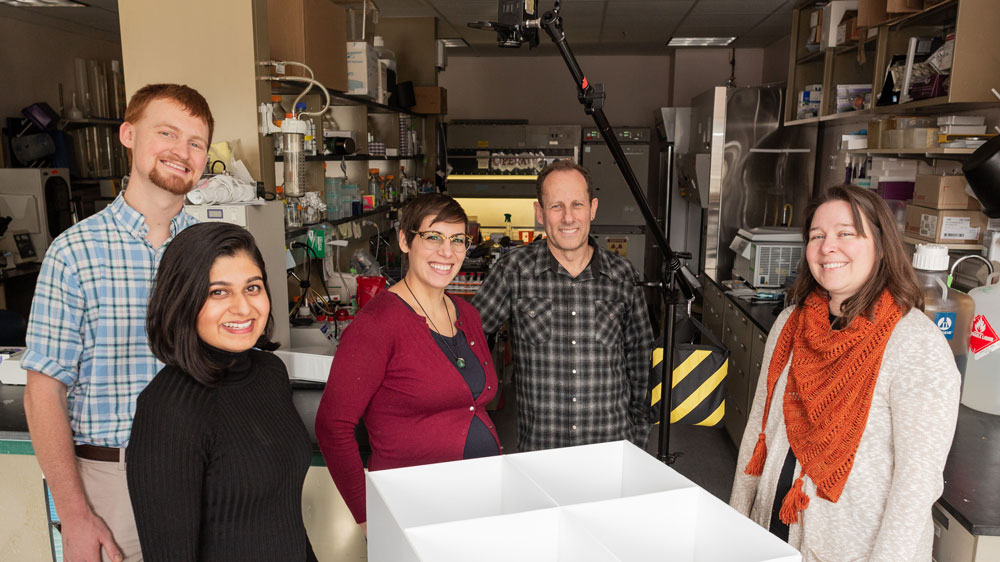Panel Will Help Bring Dartmouth BioTech Inventions To Market

On a campus like Dartmouth’s, great ideas are always under development. Dartmouth faculty members conduct cutting-edge research that could change the lives of millions of people — if it can be successfully brought to market. And that can be challenging.
“You could waste years of time unless you get the right advice,” said Barry Schweitzer, senior business development and licensing manager at the Technology Transfer Office at Dartmouth College.
That’s especially the case in biotech, a heavily-regulated industry that can take years — and lots of money — to break into commercially.
A new advisory panel orchestrated by The Magnuson Center for Entrepreneurship and the Technology Transfer Office is aiming to make the process a little bit easier for Dartmouth faculty, by providing them with feedback and guidance from experienced venture capitalists and biotech innovators. The first meeting of the External Advisory Panel took place on October 11 in Hanover.
“The major goal for the panel is to give advice to faculty about how to translate biotech research to actual clinical use,” Schweitzer explained.
During the first panel, five faculty members from Dartmouth College and Geisel Medical School presented information on their research and potential commercial applications. External advisors on the board provided feedback about patents, commercial applications and paths to market for the research and products.
Errik Anderson (’00, Thayer '06, Tuck ’07) is the CEO, Chairman and Founder of Alloy Therapeutics, LLC, and a board member at The Magnuson Center. He drew on his decades of experience in biotech innovation to provide feedback to the Dartmouth faculty.
“There are incredibly talented folks at Dartmouth inventing very transformative technologies every day. We need to find a way to bring that innovation out of the lab and get it into the hands of patients, doctors and other customers,” he said.
Having guidance from experienced biotech innovators and investors can streamline that process.
“Just because you invent something doesn’t mean it can get out into the world,” Anderson said. “You have to find a way to wrap a business model around that great idea. That’s always going to be critical.”
Saeed Hassanpour, PhD, is an associate professor in the departments of Biomedical Data Science, Computer Science, and Epidemiology at Geisel School of Medicine. He’s working on technology that uses artificial intelligence to assist pathologists in characterizing cells with microscopy images, in order to provide better diagnostics and treatment for cancer patients.
He presented to the External Advisory Board in October, and received feedback about the strengths and weaknesses of his approach to the technology. That helped him adjust his plan for moving forward, he said, and better express the value of the technology in a way that is commercially appealing.
“The new initiative is a great resource to provide feedback from experienced domain leaders on how to navigate the challenges of entrepreneurship in an academic environment,” he said.
Glenn C. Micalizio, Ph.D. is the New Hampshire Professor of Chemistry at Dartmouth College, and an investigator at the Norris Cotton Cancer Center. He gave the panel an overview of his technology platform designed to drive the discovery of novel and pharmaceutically-privileged modulators of nuclear receptors.
“The event provided a great format for discussion and brainstorming,” he said. “It’s a good start to facilitate commercialization of valuable technology developed at Dartmouth.”
Bringing a product, technology or therapy to market requires an entirely different skill set than discovering or developing it in a lab. Because of that, early interactions with business professionals can give innovators a head start in bringing their product to market.
“The earlier faculty hear about what steps are needed to move forward to clinical development, the better their outcomes,” Schweitzer said.
Increasingly, external advisory boards like the one at Dartmouth are becoming best practice at major research universities. In addition to providing early feedback, they also bring capital to campus, something that is especially valuable in a remote area like Hanover, hours away from capital hubs like Boston or New York.
“That’s a gap, but we’ve shown we can fill that gap,” Schweitzer said. “With good ideas and good connections, people will come.”
The External Advisory Board will meet quarterly. Right now it remains focused on biotech innovation from faculty, but Schweitzer said that it may expand in the future. The board will enhance the status Dartmouth already has as an institution driving innovation, he said.
“It’s filling an unmet need at Dartmouth. There’s a lot of good science, but there hasn’t been a lot of support for translational work.”
Now, through the External Advisory Panel and partnership between The Magnuson Center for Entrepreneurship and the Technology Transfer Office, that support will be more widely available, Schweitzer added.
“The Technology Transfer Office has the ability to help faculty move technology into the marketplace through startup creation, and The Magnuson Center is the natural home to take that and run with it.”
